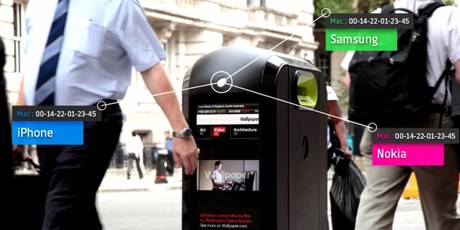
The first hand-held mobile phone was demonstrated by Motorola in 1973 and since 90s, mobile phones have become one of the technologies that have the biggest impact on the way we live. Cell phones or mobile phones have reached an impressive 96.2% of the world population and have penetrations rates of over 100% in developed nations. This information technology has spread faster that any other, including TV, Radio and the Internet. Can you remember how we lived before cellphones?
People normally have their phones either near, with or on them. Actually people are most likely to go back hope if they left their phone, than if they left their wallet. Given this pattern of use, mobile phones can be used as a great tracking device.
On any device, the location of the device can be discovered by using a technique called multilateration. What this does is calculate the difference in time for a signal from the mobile phone to reach several towers in its surroundings to “triangulate” the phone’s position. This can be done with any device (feature phone or smart-phone) as long as it is on, even if it is stand-by mode.
Finding a person by means of there mobile phones is so effective, it has been used to kill target more than 3000 persons using drones (link in German) in the last decades. In some cases, the target was found by scanning calls to be able to match the voice of the person and then finding the device, in other cases a voice call is placed to the device just to confirm the target his holding the phone.
The equipment and access required to “triangulate” a mobile phone were restricted to network operators and law enforcement, the latter normally using special access granted to them by the first. Access to this information has also been more or less regulated to protect privacy.
With the boom of smart phones, we now carry even better tracking devices. They provide gross or approximate locations (based on network information, cell and wi-fi) and fine grained or precise location by combining the network information with GPS data.
Through different Apps it is possible to obtain a precise location on a device and by it with very high probability a person. The device itself can also track its location movements, then send this information to a third party. This information is a gold mine for marketeers and agencies like the NSA.
A very innovative approach to mobile phone tracking and profiling has been implemented by Renew in London. This start up built trash bins equip with WI-fi and LCD screens, placed them all over the city for the 2012 Olympic games. Advertisers can by time on the screens and of course the idea is to make the ads as targeted as possible.

An illustration of how the technology works, identifying the phone’s manufacturer and MAC address. Credit: Renew
According to the information published by the Independent and the Renew WebSite, the bins can capture and track mobile phones in real time:
… a concise breakdown (to the 50th of a second) of the movement, type, direction, and speed of unique devices that the Renew Network gather across Renew ORB test sites, and help identify peak footfall times from key hotspots in the City of London.
Basically, they take the MAC address of the devices around it and calculate the position and direction of each of them. Depending on the profile they have associated with the device, based on model + manufacturer (Apple Iphone 5, HP Pre 3, etc) information or per-captured profiles they can target advertisement shown on the screen for these users.
A good example of what can be done would be: if a mobile phone is a recurrent customer of a coffee shop, when the user starts to make its way to the competition the bin could flash advertisements of the first shop to try and make him remember his loyalty to that brand.
Notice: By the time this post was finished, the city of London has asked Renew to stop collecting information on users.
I think is just the tip of the iceberg and that marketeers are having and will continue to a blast! with these new technologies and unregulated fields.
It is very important to be more cautious on what information we share and store on our devices and especially to decide if what we are getting in return is worth it. Remember almost nothing is for free in the world, so if there is no price tag on a cool new service you are probably paying for it in privacy and / or with your data.
As a last tip to close, keep your Wi-fi and GPS sensor turned off on your smart phone if you are not actively using them. Not only will your battery life improve, but your privacy with profit from it too.

9. May 2015 at 9:19
Excellent blog you have here.. It’s hard to find good
quality writing like yours these days. I honestly appreciate individuals like you!
Take care!!